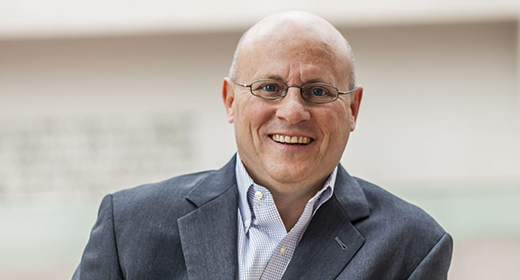
The Ford School Alumni Board is pleased to announce Paul Weech (MPP ‘81) as the recipient of the 2019 Neil Staebler Distinguished Service Award.
Weech currently serves as senior principal at Affordable Housing Institute and principal at Innovative Housing Strategies, LLC. Throughout his career, Weech has served in various senior public policy roles advancing the availability of affordable housing and the creation of communities of opportunity.
"I had the opportunity to work with Paul during the Clinton administration and know first-hand how dedicated, thoughtful, and hard-working he is. And his career since then has continued to demonstrate his leadership, commitment to service, and broad impact on our communities.” says Michael S. Barr, dean of the Ford School, who consulted with Weech on affordable housing strategies while working in the U.S. Department of Treasury. “He exemplifies what I hope our graduates will be: leaders who draw upon their public policy skills to make reasoned decisions that serve their communities well."
Weech began his career working in the federal government in 1983 at the U.S. Office of Management and Budget. He went on to work as a senior analyst for the U.S. Senate Budget Committee and as staff director of Housing Subcommittee for the U.S. Senate Committee on Banking and Urban Affairs where he was instrumental in the passage of federal legislation that improved affordable housing programs, revised the budget treatment of federal credit programs, reformed the government-sponsored enterprises, and advanced national approach to end homelessness.
He later served as vice president for Mission Strategy and Execution at Fannie Mae. Weech helped to design corporate social responsibility initiatives that included $2 trillion investments in low-income and minority homeownership mortgages and a commitment to addressing homelessness through $200 million in investments in permanent supportive housing and $10 million in grants to national homelessness organizations.
Weech has held senior roles for the Stewards of Affordable Housing for the Future (2009-2011), and the Housing Partnership Network (2009-2014), He was also the President and CEO of NeighborWorks America (2015-2017).
Weech served for many years as the chair of the Ford School Alumni Board,. He has also served on several governing and advisory boards including the Homeownership Preservation Foundation, National Housing Conference, National Low Income Housing Coalition, Morgan Stanley, Capital One, and Bank of America.
“Paul’s lifetime accomplishments across the federal government, nonprofit sector, and critical housing issues were incredibly impressive on their own,” says Alumni Board member Ian Swedish (MPP/MBA '10), who served on the Staebler Award selection committee. “But what set Paul apart, was his deep volunteer service over several years to the Ford School.”
While advancing his impressive career, Weech has kept close ties with the Ford School. A member of the first IPPS Alumni Board, Weech played a key role in drafting by-laws and developing the collaborative working style that characterizes the board today. His daughter, Ashley Weech (BA ’10), is also a graduate of the Ford School.
Weech earned his BA in political science from Duke University in 1978 and his master of public policy from the University of Michigan in 1981.
Dean Barr will formally present Weech with the Staebler Distinguished Service Award at the Ford School's Homecoming Reunion on October 4, 2019.
The Neil Staebler Distinguished Service Award is a program of the Neil Staebler Fund for Political Education, which was established at the Ford School in 1987 to honor Neil Staebler. Staebler was one of Michigan's leading political activists, and his public life was devoted to improving democratic government by increasing the participation of citizens in all aspects of public affairs.
